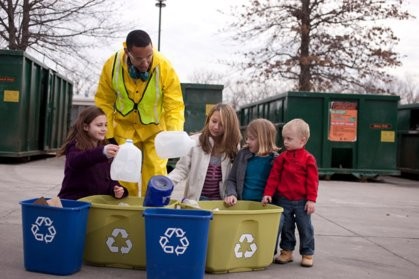Helping your children acquire more environmentally-friendly habits will teach them to protect the environment and your home is the perfect place to start. In addition, you will help them become more responsible and socially active. Introducing recycling to your home is an easy yet efficient way to achieve this. Grab an opportunity to talk to your little ones about protecting the environment and the importance of recycling. Afterwards, implement some of these tips to make recycling fun and an everyday habit.

Practice what you preach
If you give a big lecture on how recycling protects the environment and all the reasons your kids should adopt this practice, you need to be a model for your kids to follow. Children look up to their parents and often imitate their behaviour, so if you want your kids to start recycling, you need to do it, too. Otherwise, all of your efforts will be in vain and your children will quickly give up after seeing that you don’t recycle.
Personalise it
The first step is introducing different bins for plastic, paper and glass, which can be a fun activity that you and your kids can share. Each of you can decorate the bins the way you want to – use different colours, images and everything else you can think of. This way, each of your children will have their own bins, which will make them more enthusiastic about recycling.

Make it fun
If you present recycling as another chore that your children simply must do, they will quickly become bored. Instead, you should turn recycling into a fun game that your little ones will enjoy doing. For example, anyone who has the most recycled items at the end of a week is the winner and gets a fun prize. Let your imagination guide you and think of your own exciting game that will make recycling fun both for your kids and yourself.
Be creative
Recycling isn’t only about separating glass from paper or plastic, but also about reusing. So, instead of focusing just on throwing trash away, you should think of interesting ways to reuse the recycled materials your kids have collected. You can build a small art corner for recycled crafts where your kids can transform different materials into dolls, boxes and other artsy projects. Egg cartons can be used as interesting containers for their toys, while cardboard boxes can be transformed into portable drawers. Every idea that comes to your minds is a great idea as long as it keeps your kids engaged and enthusiastic about recycling.

Stop by a recycling centre
If there’s a recycling centre in your area, you should definitely plan a family trip. This is a great opportunity for your kids to meet other people who care about the environment and learn more about recycling and where the recycled materials go. You might even be able to volunteer as a family in the recycling centre you visit, so make sure to find out whether this option is available.
Answer their questions
As with everything else in the world, your children will have dozens of questions about recycling, what materials can or cannot be recycled and why. It’s essential that you answer all of their questions, because they are a sign that they are interested in recycling and you should support that. Thus, it’s essential that you learn as much as possible about recycling, the importance of waste classification, why a certain material cannot be recycled, etc. Not only will you spark your children’s interest even more, but you yourself will learn more about the importance of recycling. If you don’t know an answer to a question, you shouldn’t leave it unanswered, but find out more about it and present it to your kids once you do.
Recycling is a great place to start teaching your children about the importance of protecting the environment. Instead of presenting it as a chore, find different ways to make it more fun.
This post comes from the TODAY Parenting Team community, where all members are welcome to post and discuss parenting solutions. Learn more and join us! Because we're all in this together.
